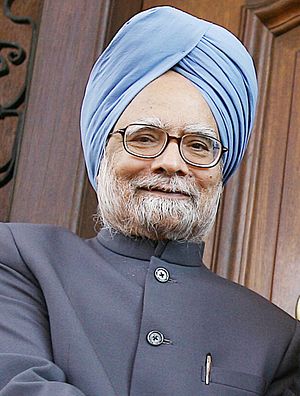A few South Asia links ahead of the weekend:
Manmohan Singh isn’t known for being outspoken to the press – that’s partly why he surprised so many on Friday when during the Q&A portion of a press conference he openly called the BJP’s candidate for Prime Minister a “disastrous” proposition for India. Singh additionally expressed support for the Congress Party Vice President and political neophyte Rahul Gandhi for the UPA’s Prime Ministerial candidate. Singh responded to one journalist with particular vim when asked if the BJP and Modi’s claims that he had been a “weak PM” held any weight:
I do not believe that I have been a weak Prime Minister. That is for historians to judge. The BJP and its associates may say whatever they like. But if by “strong Prime Minister”, you mean that you preside over a mass massacre of innocent citizens on the streets of Ahmedabad, that is the measure of strength, I do not believe that sort of strength this country needs, least of all, in its Prime Minister.
On Thursday, The Diplomat reported that Pervez Musharraf delayed a scheduled court appearance after he encountered heart issues on his way to court and was rushed to a military hospital in Rawalpindi. Further news has emerged about Musharraf’s condition: he may require an angioplasty or heart bypass, according to Dawn, and may be transferred abroad to receive treatment. According to Dawn’s sources, the “former president was undergoing extreme mental stress which led to the chest pains and his current medical condition.” Word of treating Musharraf abroad naturally raised eyebrows, particularly once his lawyers filed a petition to the Islamabad High Court to allow him to travel for treatment. That petition prompted another petition to bar Musharraf from leaving the country during his trial.
In Afghanistan, the saga over the Bilateral Security Agreement (BSA) with the United States continues, missing earlier U.S. predictions that the agreement would be concluded by New Year’s. Additionally, a plan by Hamid Karzai’s government to release 88 detainees without trial raised the ire of Republican Senators John McCain (Ariz.) and Lindsey O. Graham (S.C.).
Adding a note of optimism to the public debate on Afghanistan – particularly after the pessimistic U.S. National Intelligence Estimate (NIE) that claimed the country would fall back into conflict – the Wall Street Journal reported that Afghan security forces were making major strides in the fight against the Taliban, particularly in Helmand province. Col. B.J. Fitzpatrick, U.S. Marine Chief of Staff for Helmand told the Wall Street Journal that “the Taliban threw a lot at them. Some would even say they threw their best at them. And the security forces are still there. The Taliban can’t beat them on the battlefield.”
Dawn reports that a Technical Advisory Group meeting in Islamabad last November believes that 2014 could be the final year of polio in Pakistan, marking an important global milestone in fighting the debilitating disease. As The Diplomat’s Kiran Nazish reported recently, Pakistan’s polio workers have been targeted by the Taliban, making the task of eradicating the disease quite difficult.
The northeastern Indian state of Assam has decided to abandon Indian Standard Time, the time zone followed by all of India west of the Siliguri Corridor, in favor of an old colonial standard time zone known as “chaibagaan.” Assam’s Chief Minister Tarun Gogoi did not clarify if the move had the Central Government’s approval. The practical appeal of the time zone is that it could save 2.7 billion units of electricity, according to researchers.

































